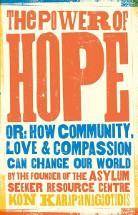The power of hope by Kon Karapanagiotidis

Harper Collins, 2018. ISBN 9781460755136
(Age: 14+) Highly recommended. Kon Karapanagiotidis is truly an
inspiring person - founder of the Asylum Seeker Resource Centre,
he fights for the rights of people who have no other help available,
determined to make a difference to their lives. And though there are
many despairing and difficult times when he has to tell another
desperate refugee that their claim for asylum has been refused, the
heartfelt gratitude from those he has helped keeps him motivated to
fight on. It is difficult to read that first chapter without being
moved to tears. I am so glad there are people like him in our
society.
However what may come as a surprise to some readers,
Karapanagiotidis has not always been the confident leader and
spokesperson that we now recognise and respect. His childhood and
youth were a struggle with self-doubt and loathing. His book bravely
reveals his young insecurities, struggles with body image, and
anxiety about relationships, issues familiar to many teenagers. What
he did have were parents, migrants to Australia, who were determined
to make a good life for their children - the values that many
migrants and refugees bring to Australia: resilience, family values,
hard work, sacrifice, and courage. Those values provided the
groundwork of his life.
As a teenager, a turning point for him was a book - Martin Luther
King's "Strength to love" with its call to 'honour your integrity,
honour your inner voice and spirit', and most especially not to
stand by but to take a stand at times of challenge and controversy.
Karapanagiotidis discovered 'the fire in his belly'.
That inner fire led to many roles working with the disabled, the
homeless, the most needy people in society, and then ultimately to
starting a project to help the many people in Melbourne seeking
asylum but with nowhere to turn for food or aid. That humble
beginning led to the establishment of the Asylum Seeker Resource Centre
now an established charity completely independent of government
funding, that provides practical support, health care, legal aid and
advocacy services to refugees both in Australia and in off-shore
detention.
This book could be seen as a call to conscience for adults but I
would suggest it for younger readers as well - the issues of sorting
out identity and meaning in life would resonate with teenagers,
particularly finding personal power in a society that doesn't meet
youthful ideals. Throughout the book, particular sentences are
picked up and bolded on a page, as inspirational quotes that can
easily be found on flicking through, serving as reminders to each of
us to go forth with passion, purpose and hope.
Helen Eddy